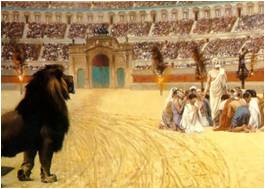 First and Second Peter are grouped in what are called the General Epistles, written to the Church at large. The theme of First Peter is the refining and growth potential in our sufferings, 1Pe 1:3, 1Pe 1:6; 1Pe 2:2. This epistle was written to believers scattered by persecution throughout Asia Minor (1 Pe 1:1). The date was circa 64-65 A.D.—the beginning of Nero’s persecutions. First Peter is the best known and loved of these epistles, called by E.J. Goodspeed, “One of the most moving pieces of persecution literature.” This epistle is written to suffering believers, and is styled by Isaac Walton as, “affectionate, loving, lowly, and humble.” This epistle conveys an intense expectation of the Lord’s return as seen in 1Pe 1:5, 1Pe 1:7, 1Pe 1:13, 1Pe 2:12, 1Pe 4:13, 1Pe 4:17, 1Pe 5:1, 1Pe 5:4.
First and Second Peter are grouped in what are called the General Epistles, written to the Church at large. The theme of First Peter is the refining and growth potential in our sufferings, 1Pe 1:3, 1Pe 1:6; 1Pe 2:2. This epistle was written to believers scattered by persecution throughout Asia Minor (1 Pe 1:1). The date was circa 64-65 A.D.—the beginning of Nero’s persecutions. First Peter is the best known and loved of these epistles, called by E.J. Goodspeed, “One of the most moving pieces of persecution literature.” This epistle is written to suffering believers, and is styled by Isaac Walton as, “affectionate, loving, lowly, and humble.” This epistle conveys an intense expectation of the Lord’s return as seen in 1Pe 1:5, 1Pe 1:7, 1Pe 1:13, 1Pe 2:12, 1Pe 4:13, 1Pe 4:17, 1Pe 5:1, 1Pe 5:4.
Gene Cunningham - October 26, 2003
Psalm 14 - Pragmatic Atheism

Scripture References: Psalms 14:4-6, Psalms 53:1-6, Psalms 18:2, Proverbs 15:3, Jeremiah 29:13, Ephesians 4:17, Psalms 14:6, Jeremiah 17:10, Psalms 27:8, John 1:6, Isaiah 11:11, Psalms 14:2-3, Isaiah 55:6, Ecclesiastes 2:13-14, Psalms 14:7, James 1:8, Numbers 35:25-28, Psalms 14:2, Proverbs 9:10, Hebrews 6:18-19, Psalms 14:1, Hebrews 12:12-13, Isaiah 53:6, Proverbs 1:7, Psalms 14:5-6, Jeremiah 17:9, Philippians 2:9, Romans 3:9-18
From Series: "Psalms - 2001"
No Summary for this series yet.

